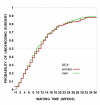Do women spend longer on wait lists for coronary bypass surgery? Analysis of a population-based registry in British Columbia, Canada
- PMID: 17683535
- PMCID: PMC1978205
- DOI: 10.1186/1471-2261-7-24
Do women spend longer on wait lists for coronary bypass surgery? Analysis of a population-based registry in British Columbia, Canada
Abstract
Background: Studies have shown patients who are delayed for surgical cardiac revascularization are faced with increased risks of symptom deterioration and death. This could explain the observation that operative mortality among persons undergoing coronary artery bypass surgery (CABG) is higher among women than men. However, in jurisdictions that employ priority wait lists to manage access to elective cardiac surgery, there is little information on whether women wait longer than men for CABG. It is therefore difficult to ascertain whether higher operative mortality among women is due to biological differences or to delayed access to elective CABG.
Methods: Using records from a population-based registry, we compared the wait-list time between women and men in British Columbia (BC) between 1990 and 2000. We compared the number of weeks from registration to surgery for equal proportions of women and men, after adjusting for priority, comorbidity and age.
Results: In BC in the 1990 s, 9,167 patients aged 40 years and over were registered on wait lists for CABG and spent a total of 136,071 person-weeks waiting. At the time of registration for CABG, women were more likely to have a comorbid condition than men. We found little evidence to suggest that women waited longer than men for CABG after registration, after adjusting for comorbidity and age, either overall or within three priority groups.
Conclusion: Our findings support the hypothesis that higher operative mortality during elective CABG operations observed among women is not due to longer delays for the procedure.
Figures
Similar articles
-
Do longer delays for coronary artery bypass surgery contribute to preoperative mortality in less urgent patients?Med Care. 2006 Jul;44(7):680-6. doi: 10.1097/01.mlr.0000220257.81482.67. Med Care. 2006. PMID: 16799363
-
Time on wait lists for coronary bypass surgery in British Columbia, Canada, 1991-2000.BMC Health Serv Res. 2005 Mar 14;5(1):22. doi: 10.1186/1472-6963-5-22. BMC Health Serv Res. 2005. PMID: 15766381 Free PMC article.
-
Unplanned emergency surgery in relation to length of wait lists at registration.Clin Invest Med. 2006 Aug;29(4):193-200. Clin Invest Med. 2006. PMID: 16986482
-
Comorbidity in patients undergoing coronary artery bypass graft surgery: impact on outcome and implications for cardiac rehabilitation.Eur J Cardiovasc Prev Rehabil. 2008 Aug;15(4):379-85. doi: 10.1097/HJR.0b013e3282fd5c6f. Eur J Cardiovasc Prev Rehabil. 2008. PMID: 18677160 Review.
-
Uncertainty, symptom distress, anxiety, and functional status in patients awaiting coronary artery bypass surgery.Heart Lung. 2006 Jan-Feb;35(1):34-45. doi: 10.1016/j.hrtlng.2005.08.002. Heart Lung. 2006. PMID: 16426934 Review.
Cited by
-
Carotid endarterectomy national trends over a decade: does sex matter?Ann Vasc Surg. 2014 May;28(4):887-92. doi: 10.1016/j.avsg.2013.08.016. Epub 2013 Dec 7. Ann Vasc Surg. 2014. PMID: 24321266 Free PMC article.
References
-
- Hurst J, Siciliani L. Tackling excessive waiting times for elective surgery: a comparison of policies in twelve OECD countries. Paris, Organisation for Economic Co-operation and Development; 2003.
-
- Ray AA, Buth KJ, Sullivan JA, Johnstone DE, Hirsch GM. Waiting for cardiac surgery: results of a risk-stratified queuing process. Circulation. 2001;104:I92–I98. - PubMed
Publication types
MeSH terms
LinkOut - more resources
Full Text Sources
Medical


